| 编辑推荐: |
本文主要介绍了一些数据清理的思路以及如何爬取数据,并处理数据使之可视化,希望对大家有帮助。
本文来自于csdn ,由火龙果软件Alice编辑,推荐。 |
|
1.数据挖掘
代码所需包
import urllib.request
import xlwt
import re
import urllib.parse
import time |
进入前程无忧官网
我这里以搜索大数据职位信息
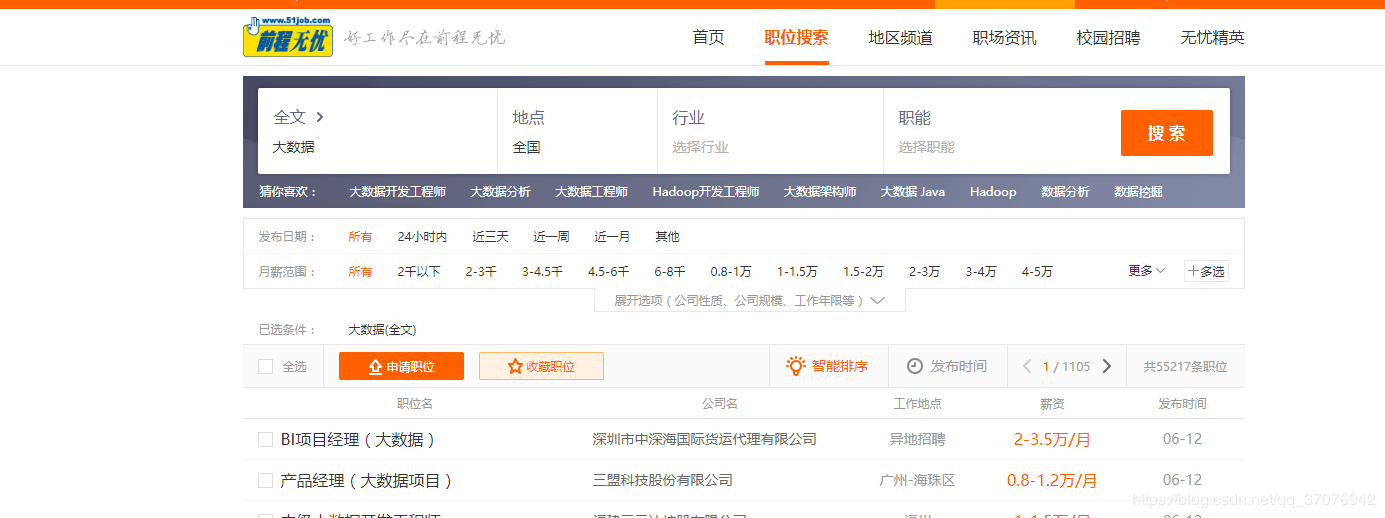
打开开发者模式
Request Headers 里面是我们用浏览器访问网站的信息,有了信息后就能模拟浏览器访问
这也是为了防止网站封禁IP,不过前程无忧一般是不会封IP的。
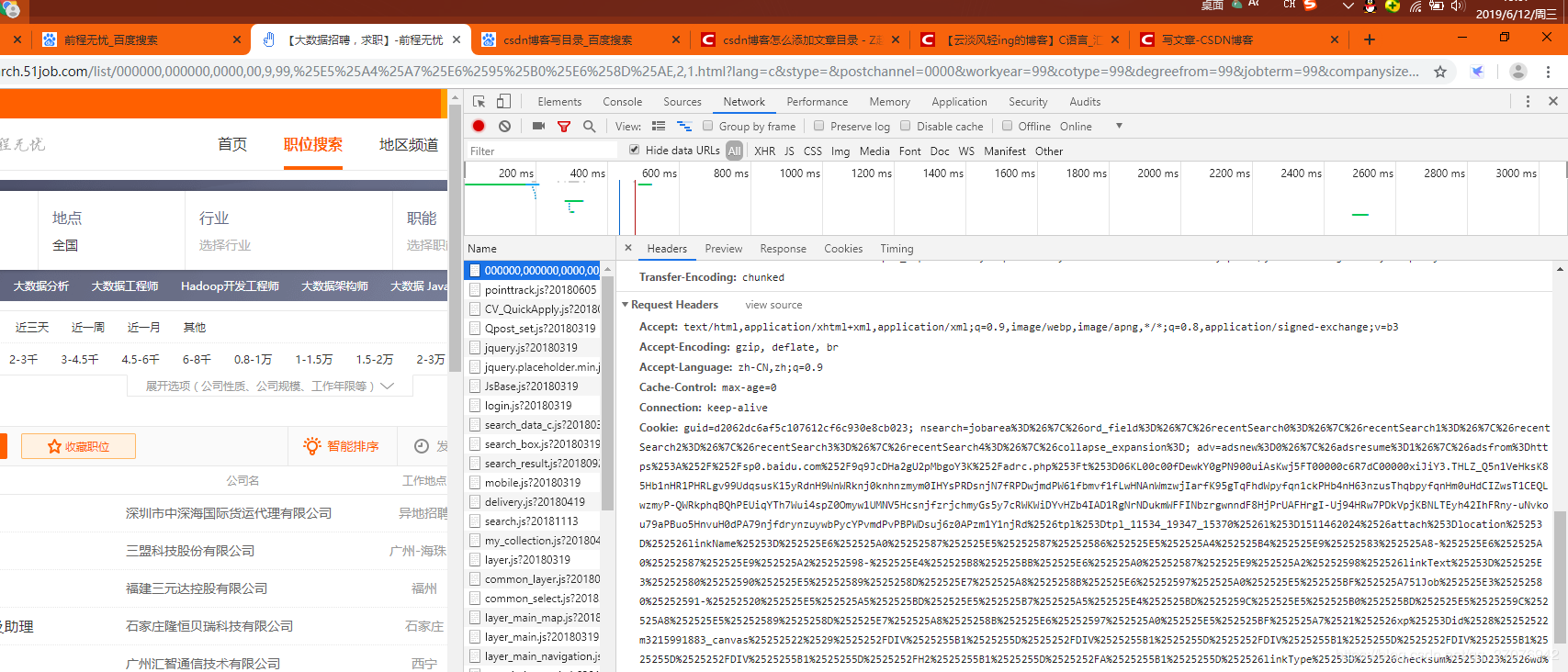
模拟浏览器
header={
'Host':'search.51job.com',
'Upgrade-Insecure-Requests':'1',
'User-Agent':'Mozilla/5.0 (Windows NT 10.0; Win64;
x64) AppleWebKit/537.36 (KHTML, like Gecko) Chrome/78.0.3904.108
Safari/537.36'
}
|

这些基本数据都可以爬取:
为了实现交互型爬取,我写了一个能够实现输入想了解的职位就能爬取相关内容的函数
def getfront(page,item):
#page是页数,
item是输入的字符串,见后文
result = urllib.parse.quote(item) #先把字符串
转成十六进制编码
ur1 = result+',2,'+ str(page)+'.html'
ur2 = 'https://search.51job.com/list
/000000,000000,0000,00,9,99,'
res = ur2+ur1 #拼接网址
a = urllib.request.urlopen(res)
html = a.read().decode('gbk')
# 读取源代码并转为unicode
return html
|
def getInformation(html):
reg = re.compile(r'class="t1 ">.*?
<a target="_blank"
title="(.*?)" href="(.*?)".*?
<span class="t2"><
a target="_blank" title="(.*?)"
href="(.*?)".*?
<span class="t3">(.*?)</span>.*?<span
class="t4">(
.*?)</span>.*?<span
class="t5">(.*?)</span>.*?',re.S)
#匹配换行符
items=re.findall(reg,html)
return items
|
这里我除了爬取图上信息外,还把职位超链接后的网址,以及公司超链接的网址爬取下来了。
这里先不讲,后面后面会说到,
接下来就需要储存信息,这里使用Excel,虽然比较麻烦,不过胜在清晰直观
#新建表格空间
excel1 = xlwt.Workbook()
# 设置单元格格式
sheet1 = excel1.add_sheet('Job', cell_overwrite_ok=True)
sheet1.write(0, 0, '序号')
sheet1.write(0, 1, '职位')
sheet1.write(0, 2, '公司名称')
sheet1.write(0, 3, '公司地点')
sheet1.write(0, 4, '公司性质')
sheet1.write(0, 5, '薪资')
sheet1.write(0, 6, '学历要求')
sheet1.write(0, 7, '工作经验')
sheet1.write(0, 8, '公司规模')
sheet1.write(0, 9, '公司类型')
sheet1.write(0, 10,'公司福利')
sheet1.write(0, 11,'发布时间') |
爬取代码如下,这里就能利用双层循环来实现换页爬取与换行输出
我这里为了获得大量数据所以爬取了1000页,调试时可以只爬取几页
number = 1
item = input()
for j in range(1,10000): #页数自己随便改
try:
print("正在爬取第"+str(j)+"页数据...")
html = getfront(j,item) #调用获取网页原码
for i in getInformation(html):
try:
url1 = i[1] #职位网址
res1 = urllib.request.urlopen(url1).read().
decode('gbk')
company = re.findall(re.compile
(r'<div class="com_tag">.
*?<p
class="at" title="(.*?)"><span
class="
i_flag">.*?
<p class="at"
title="(.*?)">.*?<p class="at"
title="(.*?)
">.*?',re.S),res1)
job_need = re.findall(re.compile(r'<p class="msg
ltype".*?>
.*? <span>|</span>
(.*?) <span>|</span>
(.*?)
<span>|</span> .*?</p>',re.S),res1)
welfare = re.findall(re.compile(r'
<span class="sp4">
(.*?)
</span>',re.S),res1)
print(i[0],i[2],i[4],i[5],company[0][0],
job_need[2][0],
job_need[1][0],company[0][1],company[0][2],
welfare,i[6])
sheet1.write(number,0,number)
sheet1.write(number,1,i[0])
sheet1.write(number,2,i[2])
sheet1.write(number,3,i[4])
sheet1.write(number,4,company[0][0])
sheet1.write(number,5,i[5])
sheet1.write(number,6,job_need[1][0])
sheet1.write(number,7,job_need[2][0])
sheet1.write(number,8,company[0][1])
sheet1.write(number,9,company[0][2])
sheet1.write(number,10,(" ".join(str(i)
for
i in welfare)))
sheet1.write(number,11,i[6])
number+=1
excel1.save("51job.xls")
time.sleep(0.3) #休息间隔,避免爬取海量数据
时被误判为攻击,IP遭到封禁
except:
pass
except:
pass
|
结果如下:
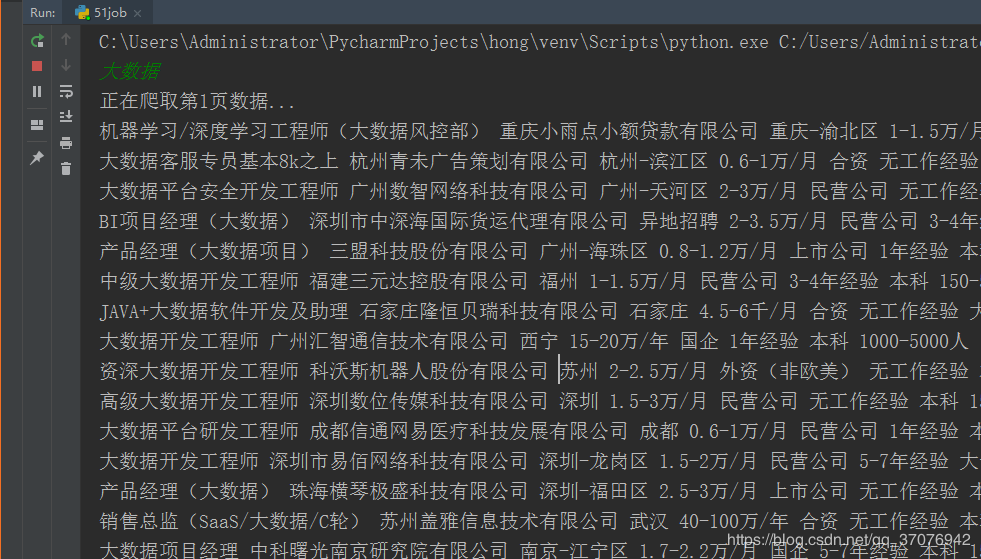
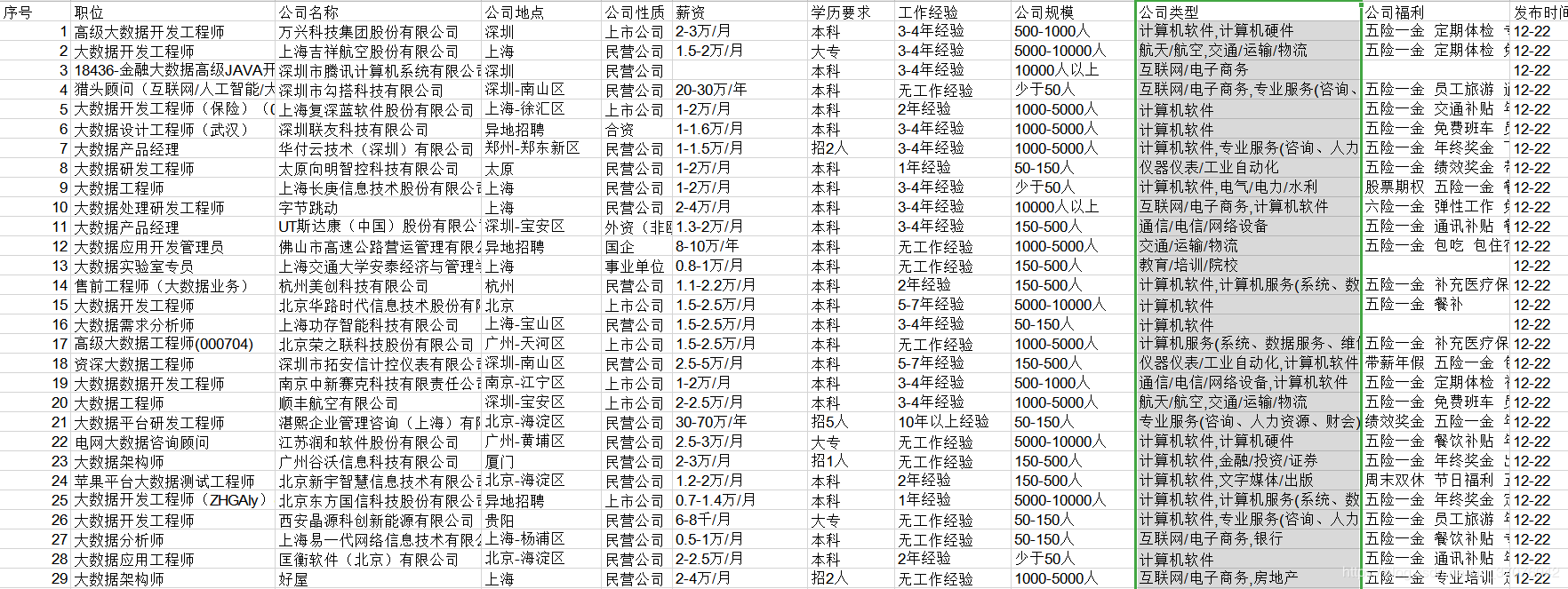
2.数据清洗
首先要打开文件
#coding:utf-8
import pandas as pd
import re
#除此之外还要安装xlrd包
data = pd.read_excel(r'51job.xls',sheet_name='Job')
result = pd.DataFrame(data) |
清洗思路:
1、出现有空值(NAN)得信息,直接删除整行
a = result.dropna(axis=0,how='any')
pd.set_option('display.max_rows',None) #输出全部行,不省略 |
2、职位出错(很多职位都是与大数据无关的职业)

b = u'数据'
number = 1
li = a['职位']
for i in range(0,len(li)):
try:
if b in li[i]:
#print(number,li[i])
number+=1
else:
a = a.drop(i,axis=0)
except:
pass |
3、其他地方出现的信息错位,比如在学历里出现 ‘招多少人’
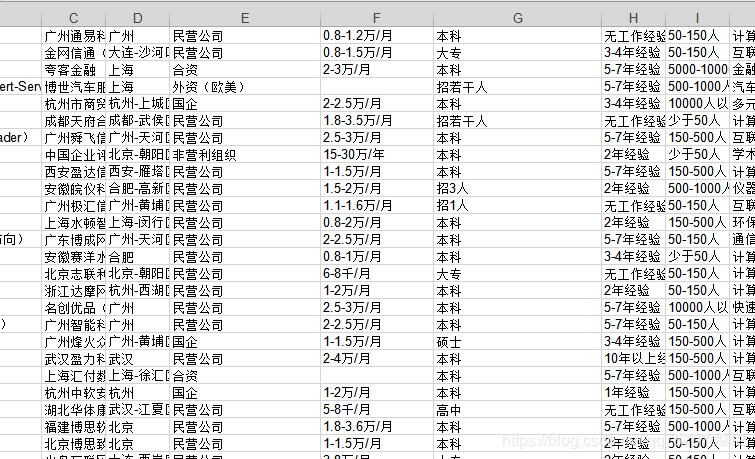
b2= u'人'
li2 = a['学历要求']
for i in range(0,len(li2)):
try:
if b2 in li2[i]:
#print(number,li2[i])
number+=1
a = a.drop(i,axis=0)
except:
pass |
4、转换薪资单位
如上图就出现单位不一致的情况
b3 =u'万/年'
b4 =u'千/月'
li3 = a['薪资']
#注释部分的print都是为了调试用的
for i in range(0,len(li3)):
try:
if b3 in li3[i]:
x = re.findall(r'\d*\.?\d+',li3[i])
#print(x)
min_ = format(float(x[0])/12,'.2f') #转换成浮点型并保留两位小数
max_ = format(float(x[1])/12,'.2f')
li3[i][1] = min_+'-'+max_+u'万/月'
if b4 in li3[i]:
x = re.findall(r'\d*\.?\d+',li3[i])
#print(x)
#input()
min_ = format(float(x[0])/10,'.2f')
max_ = format(float(x[1])/10,'.2f')
li3[i][1] = str(min_+'-'+max_+'万/月')
print(i,li3[i])
except:
pass |
保存到另一个Excel文件
| a.to_excel('51job2.xls',
sheet_name='Job', index=False) |
这里只是简单的介绍了一些数据清理的思路,并不是说只要清理这些就行了
有时候有的公司网页并不是前程无忧类型的,而是他们公司自己做的网页,这也很容易出错
不过只要有了基本思路,这些都不难清理
3.数据可视化
数据可视化可以说是很重要的环节,如果只是爬取数据而不去可视化处理,那么可以说数据的价值根本没有发挥
可视化处理能使数据更加直观,更有利于分析
甚至可以说可视化是数据挖掘最重要的内容
同样的我们先看代码需要的包
# -*- coding:
utf-8 -*-
import pandas as pd
import re
from pyecharts import Funnel,Pie,Geo
import matplotlib.pyplot as plt |
这里特别强调,pyecharts包千万别装新版的,我这里装的是0.5.9版的
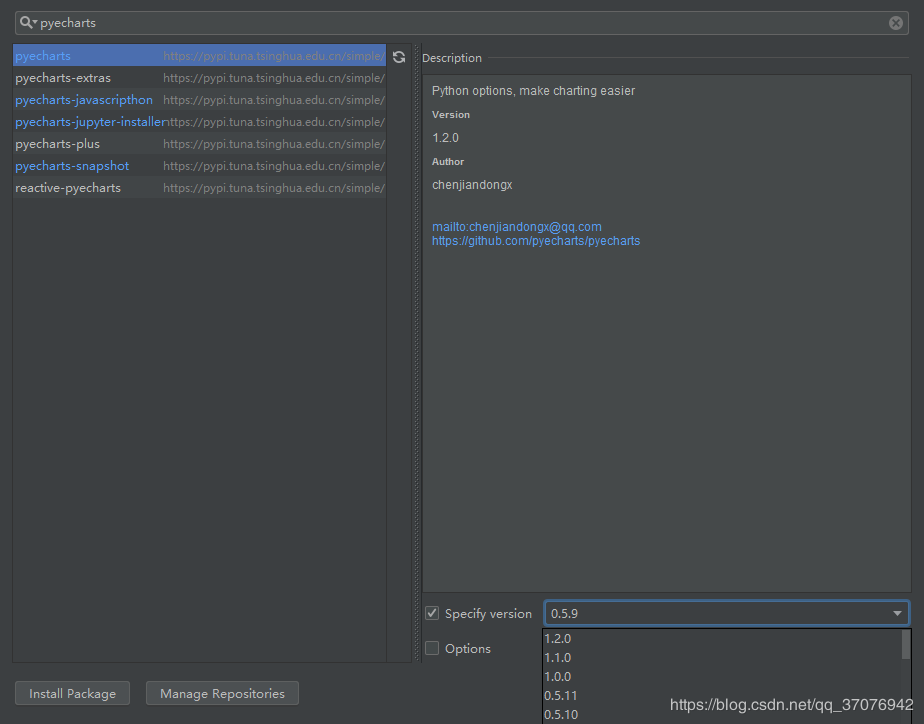
其次如果要做地理坐标图,热力图啥的,必须安装地图包,比如世界地图包,中国地图包,城市地图包啥的
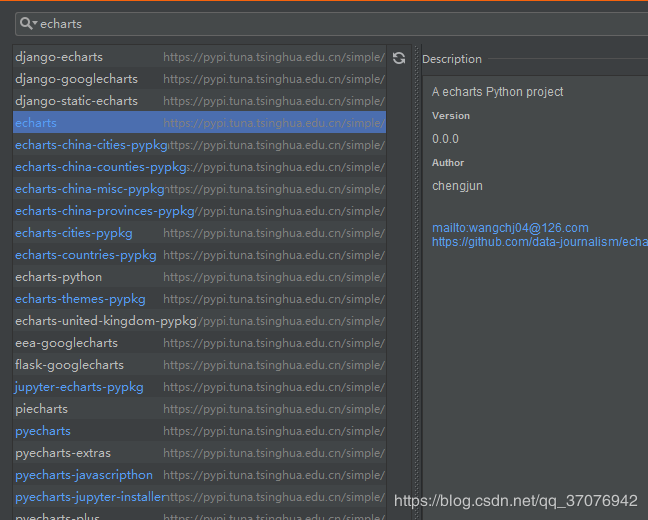
接下来就是正戏
一样的先要打开文件
file = pd.read_excel(r'51job2.xls',sheet_name='Job')
f = pd.DataFrame(file)
pd.set_option('display.max_rows',None) |
1、创建多个列表来单独存放【‘薪资’】【‘工作经验’】【‘学历要求’】【‘公司地点’】等信息
add = f['公司地点']
sly = f['薪资']
edu = f['学历要求']
exp = f['工作经验']
address =[]
salary = []
education = []
experience = []
for i in range(0,len(f)):
try:
a = add[i].split('-')
address.append(a[0])
#print(address[i])
s = re.findall(r'\d*\.?\d+',sly[i])
s1= float(s[0])
s2 =float(s[1])
salary.append([s1,s2])
#print(salary[i])
education.append(edu[i])
#print(education[i])
experience.append(exp[i])
#print(experience[i])
except:
pass |
2、matploblib库生成 工作经验—薪资图 与 学历—薪资图
min_s=[] #定义存放最低薪资的列表
max_s=[] #定义存放最高薪资的列表
for i in range(0,len(experience)):
min_s.append(salary[i][0])
max_s.append(salary[i][0])
my_df = pd.DataFrame({'experience':experience,
'min_salay' : min_s, 'max_salay' : max_s})
#关联工作经验与薪资
data1 = my_df.groupby('experience').mean()['min_salay']
.plot(kind='line')
plt.show()
my_df2 = pd.DataFrame({'education':education,
'min_salay' : min_s, 'max_salay' : max_s})
#关联学历与薪资
data2 = my_df2.groupby('education').mean()['min_salay'].
plot(kind='line')
plt.show() |
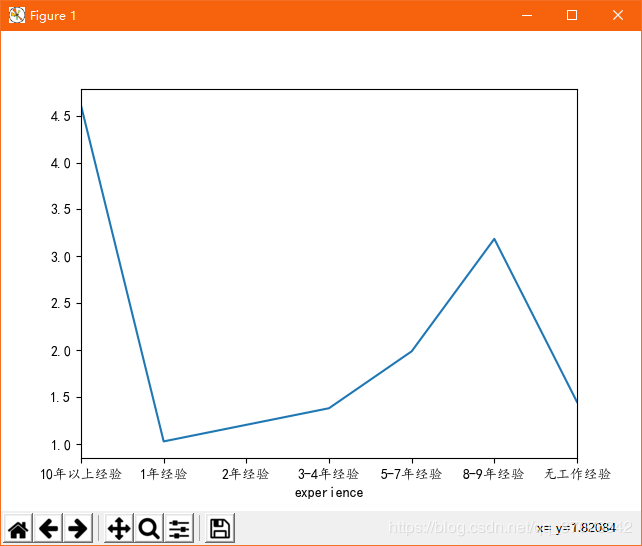
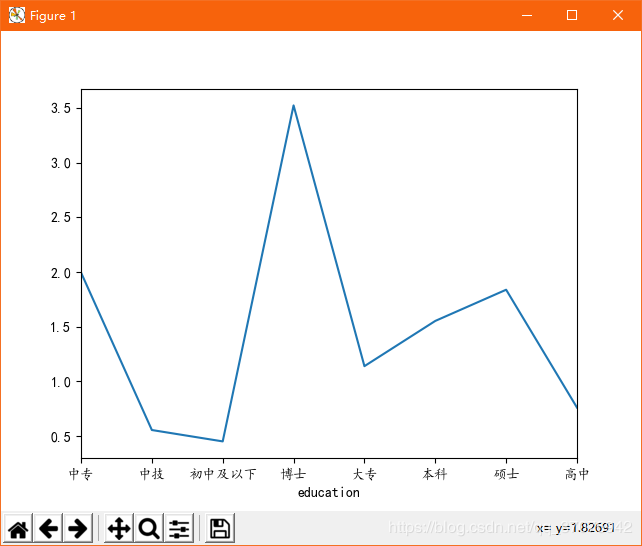
3、学历要求圆环图
def get_edu(list):
education2 = {}
for i in set(list):
education2[i] = list.count(i)
return education2
dir1 = get_edu(education)
# print(dir1)
attr= dir1.keys()
value = dir1.values()
pie = Pie("学历要求")
pie.add("", attr, value, center=[50,
50], is_random=False, radius=[30, 75], rosetype='radius',
is_legend_show=False, is_label_show=True,legend_orient='vertical')
pie.render('学历要求玫瑰图.html') |
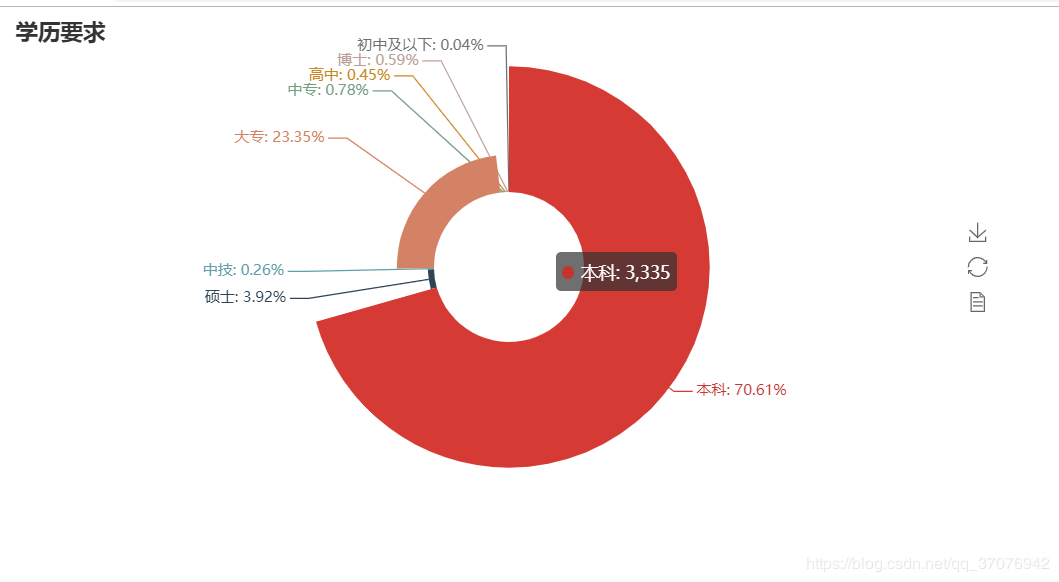

4、大数据城市需求地理位置分布图
def get_address(list):
address2 = {}
for i in set(list):
address2[i] = list.count(i)
address2.pop('异地招聘')
# 有些地名可能不合法或者地图包里没有可以自行删除,之前以下名称都会报错,现在好像更新了
#address2.pop('山东')
#address2.pop('怒江')
#address2.pop('池州')
return address2
dir2 = get_address(address)
#print(dir2)
geo = Geo("大数据人才需求分布图", title_color="#2E2E2E",
title_text_size=24,title_top=20,title_pos="center",
width=1300,height=600)
attr2 = dir2.keys()
value2 = dir2.values()
geo.add("",attr2, value2, type="effectScatter",
is_random=True, visual_range=[0, 1000], maptype='china',symbol_size=8,
effect_scale=5, is_visualmap=True)
geo.render('大数据城市需求分布图.html') |
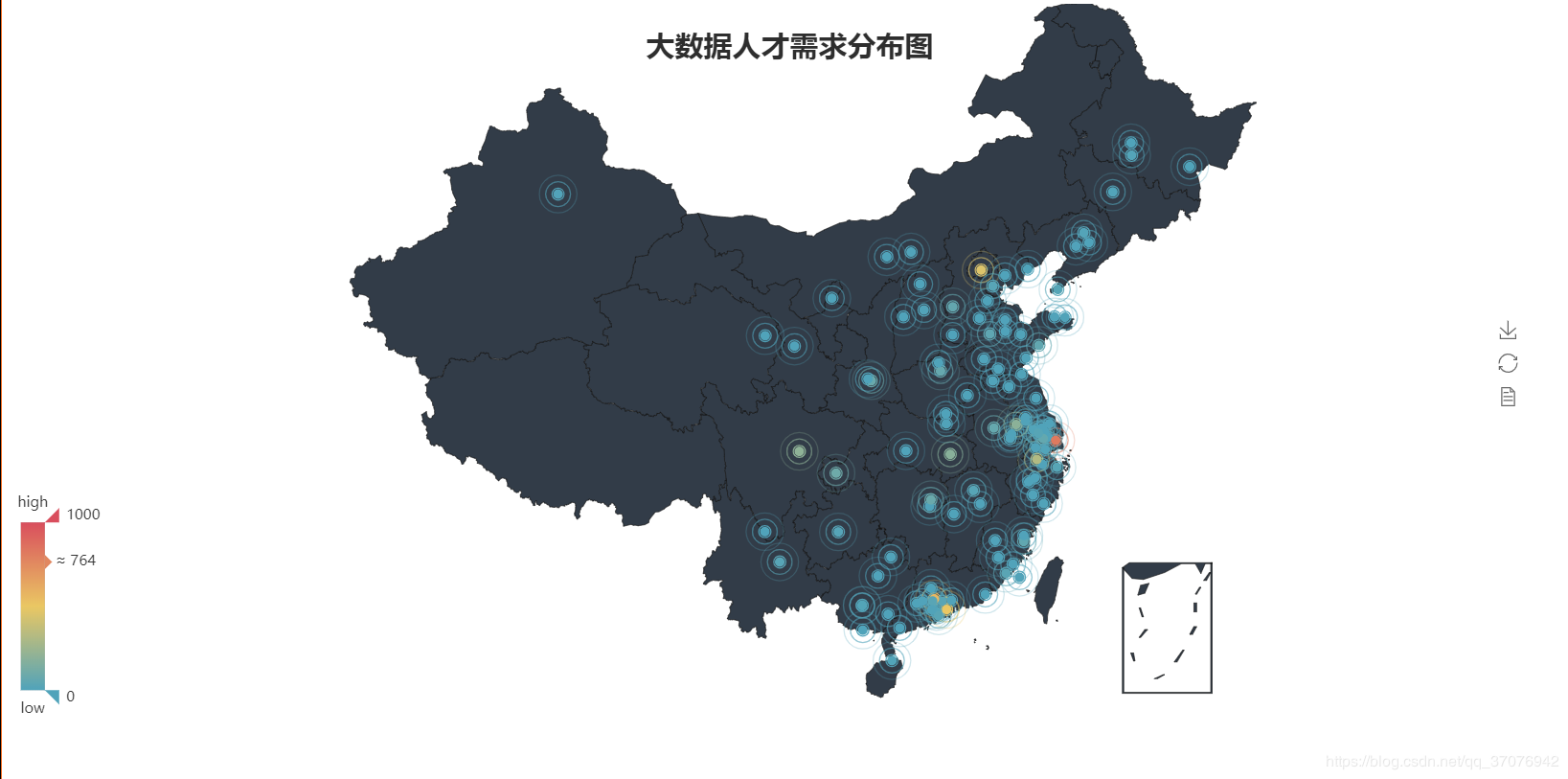
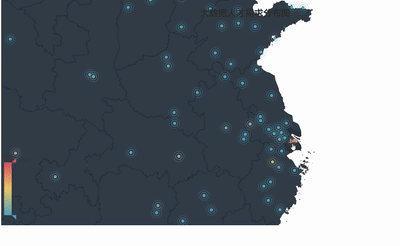
5、工作经验要求漏斗图
def get_experience(list):
experience2 = {}
for i in set(list):
experience2[i] = list.count(i)
return experience2
dir3 = get_experience(experience)
#print(dir3)
attr3= dir3.keys()
value3 = dir3.values()
funnel = Funnel("工作经验漏斗图",title_pos='center')
funnel.add("", attr3, value3,is_label_show=True,
label_pos="inside",
label_text_color="#fff",legend_orient='vertical',
legend_pos='left')
funnel.render('工作经验要求漏斗图.html') |
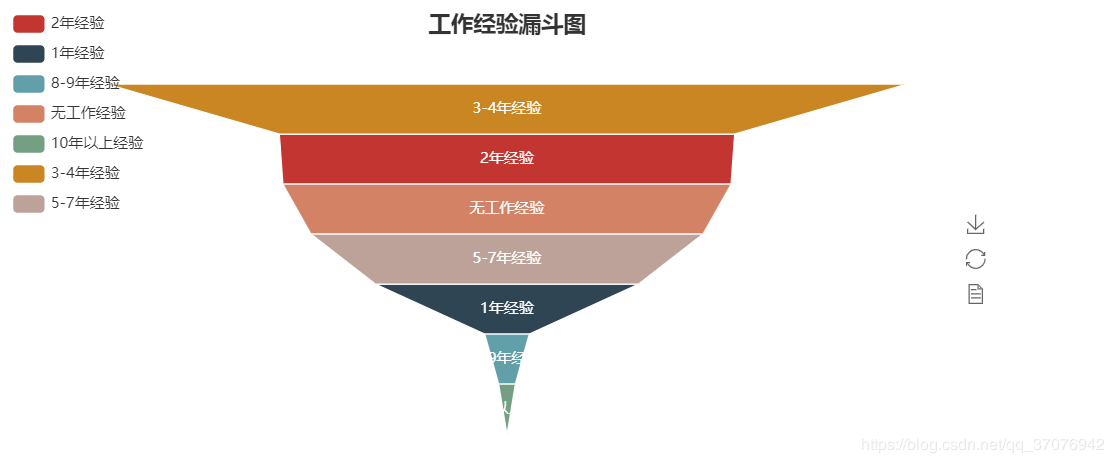
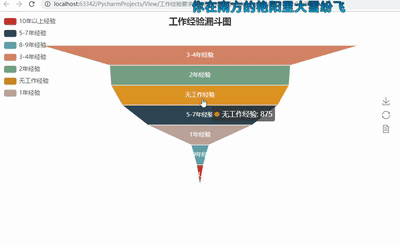
当然,pyecharts里面的图还有很多种,就靠大家去自己发掘了。
反馈
接到部分人反应的乱码情况,主要可能是因为网站规则变动。我去重新更新了一下代码,并且改进了一些地方,如果遇到爬取过程中途停下的情况,可能是网络问题或者陷入阻塞,可以重新运行一次代码
所有代码如下:
# -*- coding:utf-8
-*-
import urllib.request
import xlwt
import re
import urllib.parse
import time
header={
'Host':'search.51job.com',
'Upgrade-Insecure-Requests':'1',
'User-Agent':'Mozilla/5.0 (Windows NT 10.0;
Win64;
x64) >AppleWebKit/537.36 (KHTML,
like Gecko)
Chrome/78.0.3904.108
Safari/537.36'
}
def getfront(page,item): #page是页数,item是输入
的字符串
result = urllib.parse.quote(item) #先把字符串
转成十六进制编码
ur1 = result+',2,'+ str(page)+'.html'
ur2 = 'https://search.51job.com/list/000000,
000000,0000,00,9,99,'
res = ur2+ur1 #拼接网址
a = urllib.request.urlopen(res)
html = a.read().decode('gbk') # 读取源代码
并转为unicode
return html
def getInformation(html):
reg = re.compile(r'class="t1 ">.*?
<a target="_blank"
title="(.*?)"
href="(.*?)".*? <span class="t2">
<a
target="_blank"
title="(.*?)"
href="(.*?)".*?<span class="t3">
(.*?)</span>.
*?<span
class="t4">(.*?)</span>.*?<span
class="t5">(.*?)</span>.*?'
,re.S)#匹配换行符
items=re.findall(reg,html)
return items
#新建表格空间
excel1 = xlwt.Workbook()
# 设置单元格格式
sheet1 = excel1.add_sheet('Job',
cell_overwrite_ok=True)
sheet1.write(0, 0, '序号')
sheet1.write(0, 1, '职位')
sheet1.write(0, 2, '公司名称')
sheet1.write(0, 3, '公司地点')
sheet1.write(0, 4, '公司性质')
sheet1.write(0, 5, '薪资')
sheet1.write(0, 6, '学历要求')
sheet1.write(0, 7, '工作经验')
sheet1.write(0, 8, '公司规模')
sheet1.write(0, 9, '公司类型')
sheet1.write(0, 10,'公司福利')
sheet1.write(0, 11,'发布时间')
number = 1
item = input()
for j in range(1,10000): #页数自己随便改
try:
print("正在爬取第"+str(j)+"页数据...")
html = getfront(j,item) #调用获取网页原码
for i in getInformation(html):
try:
url1 = i[1] #职位网址
res1 = urllib.request.urlopen(url1).read().
decode('gbk')
company = re.findall(re.compile(r'<div class=
"com_tag">
.*?<p
class="at" title="(.*?)"><span
class="i_flag"
>.*?
<p class="at"
title="(.*?)">.*?<p class="at"
title="(.*?)">
.*?',re.S),res1)
job_need = re.findall(re.compile(r'<p class=
"msg
ltype".*?>
.*? <span>|</span>
(.*?) <span>|</span>
(.*?) <span>|</span>
.*?</p>',re.S),res1)
welfare = re.findall(re.compile(r'<span class="sp4">(.*?)</span>',re.S),res1)
print(i[0],i[2],i[4],i[5],company[0][0],
job_need[2][0],job_need[1][0],company[0][1],
company[0][2],welfare,i[6])
sheet1.write(number,0,number)
sheet1.write(number,1,i[0])
sheet1.write(number,2,i[2])
sheet1.write(number,3,i[4])
sheet1.write(number,4,company[0][0])
sheet1.write(number,5,i[5])
sheet1.write(number,6,job_need[2][0])
sheet1.write(number,7,job_need[1][0])
sheet1.write(number,8,company[0][1])
sheet1.write(number,9,company[0][2])
sheet1.write(number,10,(" ".join(str(i)
for i in welfare)))
sheet1.write(number,11,i[6])
number+=1
excel1.save("51job.xls")
time.sleep(0.3) #休息间隔,避免爬取
海量数据时被误判为攻击,IP遭到封禁
except:
pass
except:
pass
|
#coding:utf-8
import pandas as pd
import re
data = pd.read_excel(r'51job.xls',sheet_name='Job')
result = pd.DataFrame(data)
a = result.dropna(axis=0,how='any')
pd.set_option('display.max_rows',None)
#输出全部行,不省略
b = u'数据'
number = 1
li = a['职位']
for i in range(0,len(li)):
try:
if b in li[i]:
#print(number,li[i])
number+=1
else:
a = a.drop(i,axis=0) #删除整行
except:
pass
b2 = '人'
li2 = a['学历要求']
for i in range(0,len(li2)):
try:
if b2 in li2[i]:
# print(number,li2[i])
number += 1
a = a.drop(i, axis=0)
except:
pass
b3 =u'万/年'
b4 =u'千/月'
li3 = a['薪资']
#注释部分的print都是为了调试用的
for i in range(0,len(li3)):
try:
if b3 in li3[i]:
x = re.findall(r'\d*\.?\d+',li3[i])
#print(x)
min_ = format(float(x[0])/12,'.2f')
#转换成浮点型并保留两位小数
max_ = format(float(x[1])/12,'.2f')
li3[i][1] = min_+'-'+max_+u'万/月'
if b4 in li3[i]:
x = re.findall(r'\d*\.?\d+',li3[i])
#print(x)
#input()
min_ = format(float(x[0])/10,'.2f')
max_ = format(float(x[1])/10,'.2f')
li3[i][1] = str(min_+'-'+max_+'万/月')
print(i,li3[i])
except:
pass
a.to_excel('51job2.xls', sheet_name='Job', index=False)
import pandas as pd
import re
from pyecharts import Funnel,Pie,Geo
import matplotlib.pyplot as plt
file = pd.read_excel(r'51job2.xls',sheet_name='Job')
f = pd.DataFrame(file)
pd.set_option('display.max_rows',None)
add = f['公司地点']
sly = f['薪资']
edu = f['学历要求']
exp = f['工作经验']
address =[]
salary = []
education = []
experience = []
for i in range(0,len(f)):
try:
a = add[i].split('-')
address.append(a[0])
#print(address[i])
s = re.findall(r'\d*\.?\d+',sly[i])
s1= float(s[0])
s2 =float(s[1])
salary.append([s1,s2])
#print(salary[i])
education.append(edu[i])
#print(education[i])
experience.append(exp[i])
#print(experience[i])
except:
pass
min_s=[] #定义存放最低薪资的列表
max_s=[] #定义存放最高薪资的列表
for i in range(0,len(experience)):
min_s.append(salary[i][0])
max_s.append(salary[i][0])
#matplotlib模块如果显示不了中文字符串可以用以下代码。
plt.rcParams['font.sans-serif'] = ['KaiTi'] #
指定默认字体
plt.rcParams['axes.unicode_minus'] = False
# 解决保存图像是负号'-'显示为方块的问题
my_df = pd.DataFrame({'experience':experience,
'min_salay' : min_s, 'max_salay' : max_s})
#关联工作经验与薪资
data1 = my_df.groupby('experience').mean()
['min_salay'].plot(kind='line')
plt.show()
my_df2 = pd.DataFrame({'education':education,
'min_salay' : min_s, 'max_salay' : max_s})
#关联学历与薪资
data2 = my_df2.groupby('education').mean()
['min_salay'].plot(kind='line')
plt.show()
def get_edu(list):
education2 = {}
for i in set(list):
education2[i] = list.count(i)
return education2
dir1 = get_edu(education)
# print(dir1)
attr= dir1.keys()
value = dir1.values()
pie = Pie("学历要求")
pie.add("", attr, value, center=[50,
50],
is_random=False, radius=[30, 75], rosetype='radius',
is_legend_show=False, is_label_show=True,
legend_orient='vertical')
pie.render('学历要求玫瑰图.html')
def get_address(list):
address2 = {}
for i in set(list):
address2[i] = list.count(i)
address2.pop('异地招聘')
# 有些地名可能不合法或者地图包里没有可以自行删除,
之前以下名称都会报错,现在好像更新了
#address2.pop('山东')
#address2.pop('怒江')
#address2.pop('池州')
return address2
dir2 = get_address(address)
#print(dir2)
geo = Geo("大数据人才需求分布图", title_color="#2E2E2E",
title_text_size=24,title_top=20,title_pos="center",
width=1300,height=600)
attr2 = dir2.keys()
value2 = dir2.values()
geo.add("",attr2, value2, type="effectScatter",
is_random=True, visual_range=[0, 1000], maptype='china',
symbol_size=8,
effect_scale=5, is_visualmap=True)
geo.render('大数据城市需求分布图.html')
def get_experience(list):
experience2 = {}
for i in set(list):
experience2[i] = list.count(i)
return experience2
dir3 = get_experience(experience)
#print(dir3)
attr3= dir3.keys()
value3 = dir3.values()
funnel = Funnel("工作经验漏斗图",title_pos='center')
funnel.add("", attr3, value3,is_label_show=True,
label_pos="inside",
label_text_color="#fff",legend_orient='vertical',
legend_pos='left')
funnel.render('工作经验要求漏斗图.html')
|
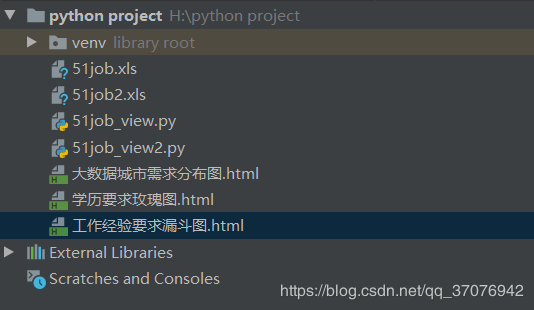
HTML文件最好用谷歌浏览器打开,如果点开没反应可以在文件夹里找到该文件然后打开
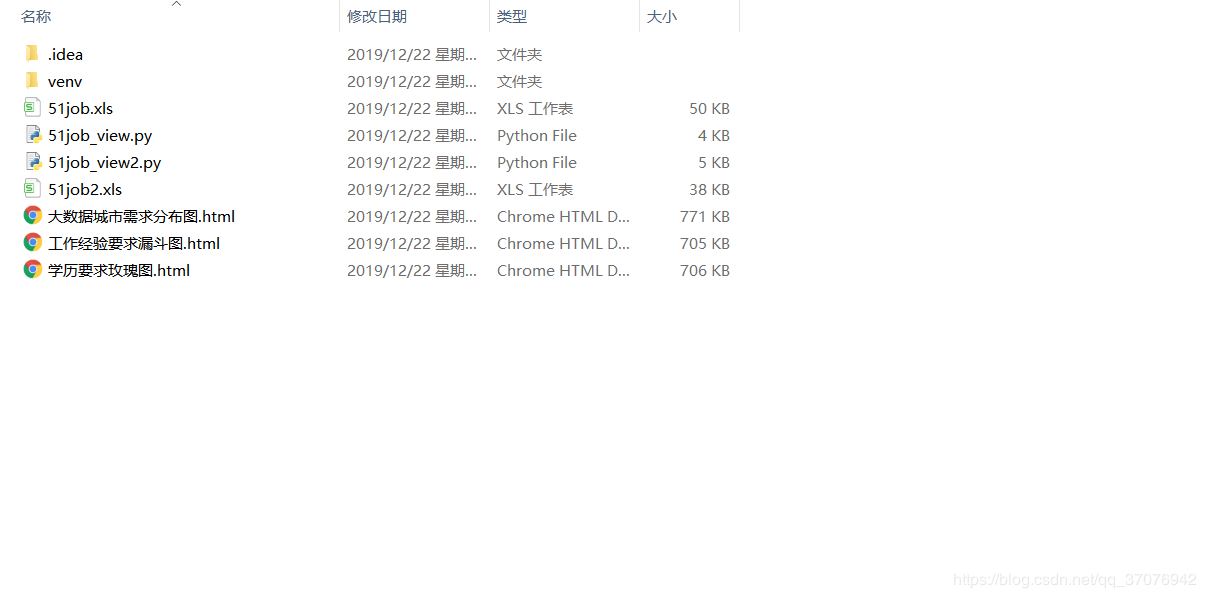
|

